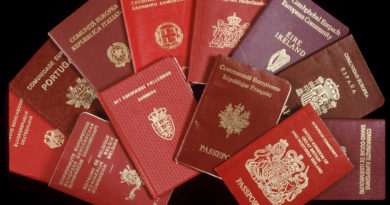Briton goes to court to defend his EU citizenship after exclusion from Berlin elections
A British national prevented from standing in Berlin’s municipal elections is arguing in court that he should keep his political rights as an EU citizen even though the UK has left the European Union.
On September 26, Germans will go to the polls for the federal elections. Berliners will also vote for the borough assemblies and the city-state parliament.
Under EU law, EU citizens who live in Germany will be able to vote and stand as candidates in municipal elections (not in the state and federal ones).
Matt Bristow, a British psychologist who has been living in Germany since 2018, was hoping to keep this benefit and stand for Volt Deutschland in the Berlin borough of Pankow. But the local electoral commission blocked his candidacy because, following the UK withdrawal from the EU, he no longer possesses the citizenship of an EU member state.
After complaining without success with the borough and the state electoral commission, Bristow is challenging the decision before the constitutional court in Berlin.
He has asked with an urgent procedure to be allowed to stand in the election, but the request was rejected.
In the proceedings that will follow, Bristow and his lawyers will seek to convince the judges to refer the question on whether UK citizens remain EU citizens to the Court of Justice of the EU. A number of similar cases are already pending at the Luxembourg court.
“The point is really to claim the right to remain an EU citizen,” Bristow told Europe Street. “EU citizenship is a fundamental right. Members of the European Union have two citizenships, national and European, that run in parallel. EU citizenship is received automatically and is an individual status. Although the UK has left the Union, there is still a connection between the EU as a legal entity and the individual, which is not mediated by a member state,” he said.
“Why would we need a regional citizenship if it is only attached to that of a member state?” he added.
In the challenge, Bristow is represented by constitutional lawyer Michael Plöse and EU lawyer Dr Alexandra von Westernhagen, who initiated a separate case at the Court of Justice of the European Union to determine whether EU citizenship is an independent status.
Both cases put into question some parts of the UK withdrawal agreement, which was negotiated on the assumption that UK citizens no longer have EU citizenship after Brexit.
“Having been conferred, EU citizenship is a fundamental, individual right, which according to applicable EU law as well as the European Human Rights Convention cannot be removed without any due process. EU citizenship therefore is not automatically lost when the country of origin leaves the Union,” explained Alexandra von Westernhagen.
EU citizenship was introduced by the Treaty of Maastricht of 1992 with the objective “to strengthen the protection of the rights and interests” of nationals of EU member states. “Every person holding the nationality of a member state shall be a citizen of the Union,” the treaty says.
The treaty also specifies that EU citizenship gives every national of an EU country the right to travel and live freely anywhere in the EU, vote and stand as a candidate in European and local elections in the country of residence, receive diplomatic assistance and protection by other member countries’ embassies and consulates, and petition and complain with the European institutions. A number of EU directives detail how to implement these rights in practice.
Bristow says if the legal challenge is successful, UK citizens born before 31 January 2020 (the date the UK left the European Union) should maintain free movement in the EU without reciprocity from the UK. The way this would occur in practice would however require changes to UK law, which will probably have to be determined with further litigation.
Matt Bristow was born in London and has lived in Germany on and off since 2006. This is the first time he has stood for political office.
“We unequivocally criticise the exclusion of Matt Bristow from our electoral list on the basis of his British nationality. We regard this decision as being incompatible with EU law,” said Paul Loeper, Co-Chair of Volt Deutschland.
In 2020 a UK citizen who was councillor in the French department of Dordogne seized the courts to claim the right to stand again in the local elections. The Council of State, France’s top administrative court, ruled that Britons in France could no longer stand as a result of Brexit.
The UK has recently introduced a bill that continues voting and candidacy rights in local elections for EU citizens who were living in the UK before 31 December 2020.
Claudia Delpero © all rights reserved.
The article has been revised after publication with clarifications about the legal proceeding. Information about the Berlin court decision was added on 20 September 2021. Image by Andy Leung from Pixabay
Europe Street News is an online magazine covering citizens’ rights in the EU and the UK. We are fully independent and we are committed to providing factual, accurate and reliable information. As citizens’ rights are at the core of democracy, our website and newsletter are available for free. Please consider making a contribution so we can continue and expand our coverage. Thank you!




